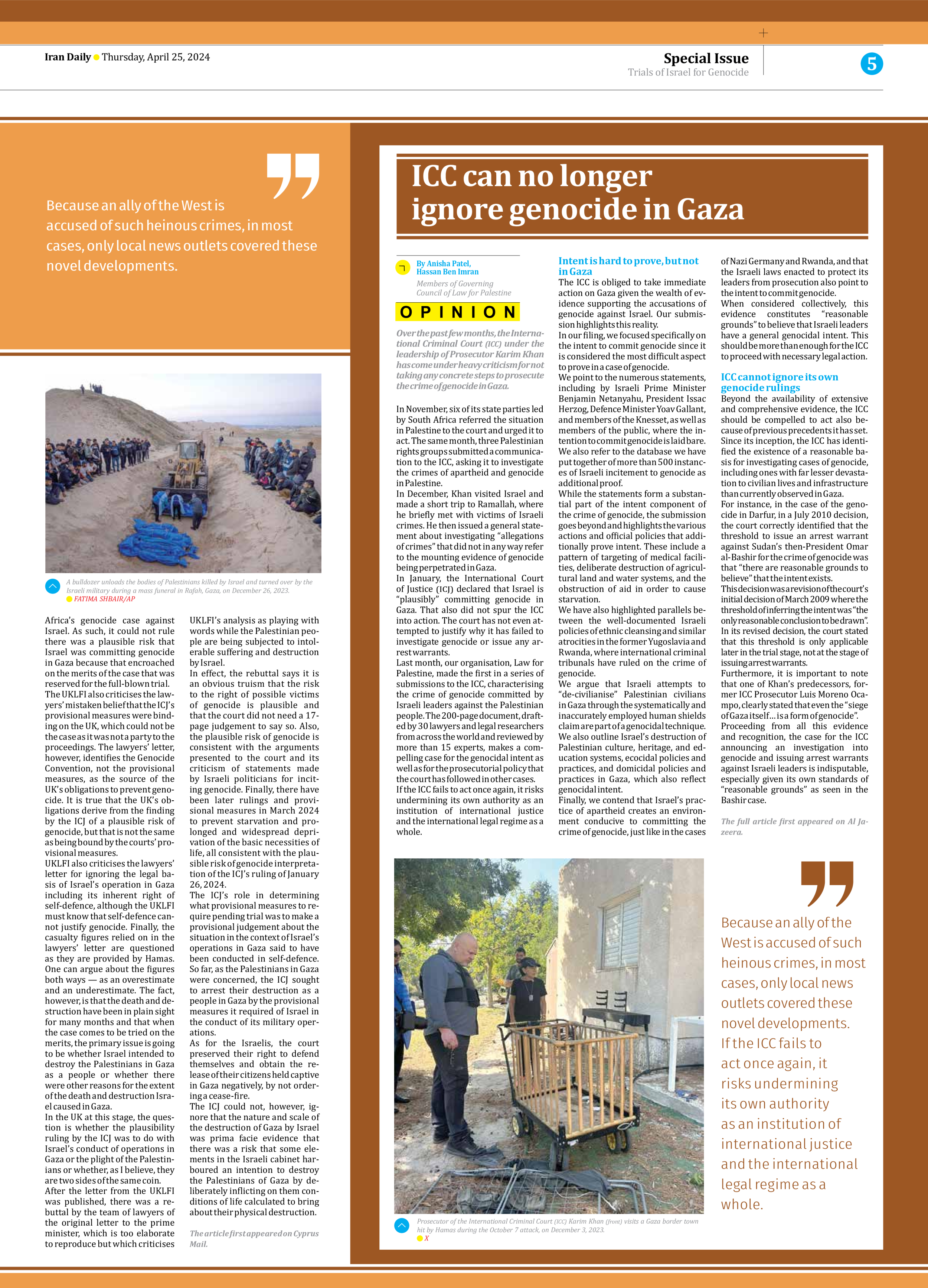
ICC can no longer ignore genocide in Gaza
Over the past few months, the International Criminal Court (ICC) under the leadership of Prosecutor Karim Khan has come under heavy criticism for not taking any concrete steps to prosecute the crime of genocide in Gaza.
By Anisha Patel,
Hassan Ben Imran
Members of Governing Council of Law for Palestine
In November, six of its state parties led by South Africa referred the situation in Palestine to the court and urged it to act. The same month, three Palestinian rights groups submitted a communication to the ICC, asking it to investigate the crimes of apartheid and genocide in Palestine.
In December, Khan visited Israel and made a short trip to Ramallah, where he briefly met with victims of Israeli crimes. He then issued a general statement about investigating “allegations of crimes” that did not in any way refer to the mounting evidence of genocide being perpetrated in Gaza.
In January, the International Court of Justice (ICJ) declared that Israel is “plausibly” committing genocide in Gaza. That also did not spur the ICC into action. The court has not even attempted to justify why it has failed to investigate genocide or issue any arrest warrants.
Last month, our organisation, Law for Palestine, made the first in a series of submissions to the ICC, characterising the crime of genocide committed by Israeli leaders against the Palestinian people. The 200-page document, drafted by 30 lawyers and legal researchers from across the world and reviewed by more than 15 experts, makes a compelling case for the genocidal intent as well as for the prosecutorial policy that the court has followed in other cases.
If the ICC fails to act once again, it risks undermining its own authority as an institution of international justice and the international legal regime as a whole.
Intent is hard to prove, but not in Gaza
The ICC is obliged to take immediate action on Gaza given the wealth of evidence supporting the accusations of genocide against Israel. Our submission highlights this reality.
In our filing, we focused specifically on the intent to commit genocide since it is considered the most difficult aspect to prove in a case of genocide.
We point to the numerous statements, including by Israeli Prime Minister Benjamin Netanyahu, President Issac Herzog, Defence Minister Yoav Gallant, and members of the Knesset, as well as members of the public, where the intention to commit genocide is laid bare. We also refer to the database we have put together of more than 500 instances of Israeli incitement to genocide as additional proof.
While the statements form a substantial part of the intent component of the crime of genocide, the submission goes beyond and highlights the various actions and official policies that additionally prove intent. These include a pattern of targeting of medical facilities, deliberate destruction of agricultural land and water systems, and the obstruction of aid in order to cause starvation.
We have also highlighted parallels between the well-documented Israeli policies of ethnic cleansing and similar atrocities in the former Yugoslavia and Rwanda, where international criminal tribunals have ruled on the crime of genocide.
We argue that Israeli attempts to “de-civilianise” Palestinian civilians in Gaza through the systematically and inaccurately employed human shields claim are part of a genocidal technique. We also outline Israel’s destruction of Palestinian culture, heritage, and education systems, ecocidal policies and practices, and domicidal policies and practices in Gaza, which also reflect genocidal intent.
Finally, we contend that Israel’s practice of apartheid creates an environment conducive to committing the crime of genocide, just like in the cases of Nazi Germany and Rwanda, and that the Israeli laws enacted to protect its leaders from prosecution also point to the intent to commit genocide.
When considered collectively, this evidence constitutes “reasonable grounds” to believe that Israeli leaders have a general genocidal intent. This should be more than enough for the ICC to proceed with necessary legal action.
ICC cannot ignore its own
genocide rulings
Beyond the availability of extensive and comprehensive evidence, the ICC should be compelled to act also because of previous precedents it has set.
Since its inception, the ICC has identified the existence of a reasonable basis for investigating cases of genocide, including ones with far lesser devastation to civilian lives and infrastructure than currently observed in Gaza.
For instance, in the case of the genocide in Darfur, in a July 2010 decision, the court correctly identified that the threshold to issue an arrest warrant against Sudan’s then-President Omar al-Bashir for the crime of genocide was that “there are reasonable grounds to believe” that the intent exists.
This decision was a revision of the court’s initial decision of March 2009 where the threshold of inferring the intent was “the only reasonable conclusion to be drawn”. In its revised decision, the court stated that this threshold is only applicable later in the trial stage, not at the stage of issuing arrest warrants.
Furthermore, it is important to note that one of Khan’s predecessors, former ICC Prosecutor Luis Moreno Ocampo, clearly stated that even the “siege of Gaza itself… is a form of genocide”.
Proceeding from all this evidence and recognition, the case for the ICC announcing an investigation into genocide and issuing arrest warrants against Israeli leaders is indisputable, especially given its own standards of “reasonable grounds” as seen in the Bashir case.
The full article first appeared on Al Jazeera.







